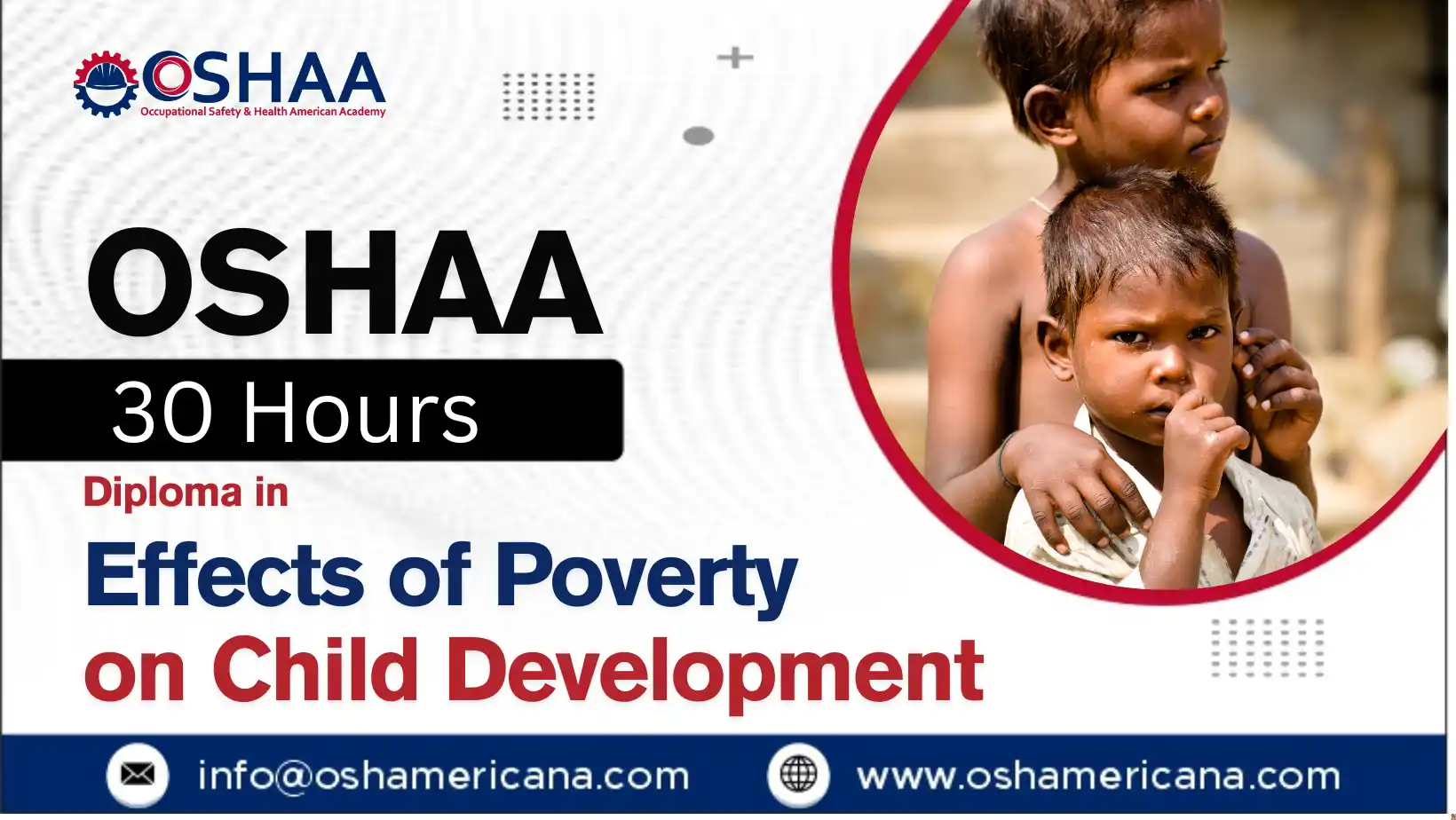Understand Child Development and Poverty with the Diploma – Make a Real Impact
Understanding the multifaceted impact of poverty on child development is essential for professionals working with children, families, and communities. The OSHAA 30-Hours Diploma in Effects of Poverty on Child Development offers an in-depth exploration into how economic hardship influences cognitive, emotional, physical, and social development in children. This diploma equips participants with the knowledge and practical strategies to identify challenges, intervene early, and advocate for effective support mechanisms.
Poverty is more than a lack of income—it affects every dimension of a child’s life, from access to healthcare and nutrition to educational attainment and emotional well-being. Growing up in economically disadvantaged conditions can have lasting consequences, often perpetuating cycles of inequality and underachievement.
This professional diploma is designed to help participants explore the evidence-based links between poverty and developmental outcomes. It draws upon the latest research in psychology, education, health, and social work to provide a comprehensive understanding of how poverty shapes a child’s trajectory and what can be done to mitigate its effects.
Over the course of 30 guided learning hours, participants will engage with key themes related to the causes and consequences of child poverty, early childhood development, educational barriers, trauma, and resilience. The course places particular emphasis on practical intervention strategies that can be used in both policy and frontline service roles.
OSHAA 30-Hours Diploma in Effects of Poverty on Child Development
Study Units
Learning Outcomes
Understanding Child Development and the Dimensions of Poverty (3 Hours)
- Explain key stages of child development across physical, emotional, cognitive, and social domains
- Define the different dimensions of poverty, including absolute, relative, and multidimensional poverty
- Recognise how poverty affects development from infancy through adolescence
- Identify socio-economic indicators that impact children’s long-term outcomes
The Impact of Poverty on Early Brain and Emotional Development (4 Hours)
- Understand how chronic stress and deprivation affect early brain structure and function
- Explore the influence of limited stimulation and insecure environments on emotional growth
- Identify critical periods in early development vulnerable to environmental hardship
- Apply strategies to support emotional regulation in children experiencing poverty
Physical Health, Nutrition, and Access to Healthcare in Low-Income Households (5 Hours)
- Identify the effects of malnutrition and food insecurity on physical development
- Examine barriers to healthcare access for families in poverty
- Understand the link between poor living conditions and increased health risks
- Support health promotion practices within disadvantaged communities
Educational Disadvantage and Learning Barriers (4 Hours)
- Recognise how poverty limits access to quality early childhood education and learning resources
- Identify behavioural and cognitive challenges common in low-income learning environments
- Understand the role of schools in addressing educational inequality
- Implement inclusive strategies to support learning and participation
Family Stress, Attachment Disruption, and Parenting in Poverty (6 Hours)
- Understand the effects of economic stress on parenting capacity and family dynamics
- Explore attachment theory in the context of instability and limited support systems
- Identify risk factors for neglect, inconsistent caregiving, and emotional unavailability
- Promote supportive parenting practices and family resilience in challenging circumstances
Environmental Influences and Community-Level Risk Factors (3 Hours)
- Examine how unsafe neighbourhoods, housing instability, and community violence affect development
- Understand the impact of social exclusion and stigma on child well-being
- Identify the role of public services, infrastructure, and local policy in shaping opportunity
- Advocate for safer, more supportive environments for children and families
Trauma, Neglect, and Adverse Childhood Experiences (ACEs) (4 Hours)
- Define and categorise various ACEs and their long-term developmental consequences
- Identify signs of trauma and neglect in children of different ages
- Understand the cumulative impact of stress and adversity on emotional health
- Apply trauma-informed approaches to support recovery and resilience
Building Resilience and Supporting Protective Factors (3 Hours)
- Identify key protective factors that buffer the impact of poverty on child development
- Promote social and emotional competencies in children
- Encourage positive relationships with caregivers, peers, and community members
- Design supportive environments that nurture coping skills and self-esteem
Course Benefits: OSHAA 30-Hours Diploma in Effects of Poverty on Child Development
- Provides a comprehensive understanding of how poverty impacts all stages of child development
- Equips participants with the knowledge to recognise early signs of developmental delays and emotional distress
- Enhances ability to support children through trauma-informed and developmentally appropriate practices
- Builds confidence in working with families facing complex socio-economic challenges
- Promotes practical skills in designing and implementing support plans across education, health, and social settings
- Encourages the use of evidence-based strategies to build resilience and protective factors in vulnerable children
- Raises awareness of systemic inequalities and how they contribute to long-term developmental risk
- Supports participants in becoming effective advocates for children’s rights, well-being, and access to services
- Strengthens inter-agency collaboration and referral processes to improve family outcomes
- Provides a recognised qualification that supports career advancement in early years, education, healthcare, and social care sectors
The OSHAA 30-Hours Diploma in Effects of Poverty on Child Development is designed for participants who work with or support children and families in educational, healthcare, or community-based roles. It is particularly suitable for:
- Early years practitioners, teachers, and teaching assistants working with disadvantaged children
- Social workers, family support workers, and child protection professionals
- Healthcare providers including health visitors, nurses, and community health workers
- Community outreach workers and those in charitable or non-governmental organisations
- Educational psychologists and behavioural support staff
- Policy advisors and programme coordinators involved in child welfare and poverty reduction initiatives
This course is ideal for participants seeking to deepen their understanding of child development within the context of poverty, improve support strategies, and advocate for long-term change in vulnerable communities.







